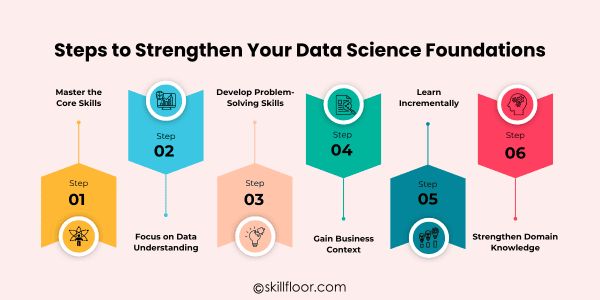Build Strong Data Science Foundations Now
Master the fundamentals of data science to avoid frustration and failure. Build confidence, boost accuracy, and unlock career growth with core skills today.

Data science is revolutionizing sectors, fostering company expansion, and saving lives in the medical field. Although it's a strong tool, knowing the fundamentals is the first step to success. Many novices suffer later after skipping this stage. To reach your full potential and succeed in this fascinating subject, concentrate on laying a strong foundation.
Many beginners become frustrated as they jump right into advanced technologies without first learning the fundamentals. A coworker had trouble until they went over fundamentals like data cleansing, demonstrating the need for data science foundations. Having trained teams and produced outcomes for years, I've seen that success and confidence in an ever-changing sector can be gained by grasping these principles.
These pointers are based on practical experience rather than only theory. With the help of these helpful tips and data science courses, you may establish a strong foundation in data science. Trust the process, take your time, and concentrate on the fundamentals. With perseverance and hard work, you will develop your abilities and self-assurance.
What is Data Science?
The art of transforming unstructured data into insightful knowledge is known as data science. To identify patterns, forecast trends, and resolve issues, it integrates computer programming, statistics, and mathematics. Data science is essential in influencing everything from commercial choices to medical advancements.
Data scientists tackle real-world problems using their established techniques and practical knowledge, making sure their work has a significant impact. Gaining an understanding of data science foundations enables you to make more informed choices, overcome obstacles, and provide value in a variety of contexts, making this ever-evolving discipline both fascinating and fulfilling.
Essential Data Science Concepts for a Strong Foundation
1. Statistics Basics
It is essential to comprehend probability, distributions, mean, and median. These ideas assist you in efficiently analyzing facts and coming to wise conclusions in practical situations.
2. Programming Skills
Learn R or Python to automate activities, create models, and handle data. For effective completion of routine data science activities, these languages are necessary.
3. Data Cleaning
Accurate analysis is guaranteed when data cleansing is mastered. Errors must be eliminated, duplicates must be dealt with, and data must be arranged in order to yield insightful information.
4. Exploratory Data Analysis (EDA)
You can find trends, patterns, and anomalies in data with the aid of EDA. In order to create reliable models and make well-informed judgments, this is an essential step.
5. Mathematics for Data Science
Many algorithms are built on the foundation of linear algebra and calculus. Gaining knowledge of these ideas improves your comprehension of data science models.
6. Core Principles
Your work will be accurate, accountable, and significant if you pay attention to the principles of data science, such as reproducibility and ethical behavior.
Understanding the Scope of Data Science in the Modern World
Data science is tackling complicated issues and changing industries. To find insights, forecast trends, and make data-driven decisions, experts in fields ranging from retail to healthcare examine enormous data sets. Businesses may accomplish previously unattainable achievements, enhance client experiences, and optimize processes thanks to this knowledge.
Applications of data science in the real world are everywhere. For example, hospitals utilize predictive models to improve patient care, while e-commerce platforms use recommendation algorithms to customize customer experiences. Data scientists overcome obstacles, hone their abilities, and consistently increase the impact of their work via practical experience.
Data scientists establish credibility by producing dependable outcomes using tried-and-true techniques and moral behavior. By emphasizing accountability, accuracy, and openness, they make sure their work respects data privacy while also benefiting society. This dedication enhances the field's standing as a vital instrument in the data-driven world of today.
Steps to Strengthen Your Data Science Foundations
1. Master the Core Skills
Statistics and mathematics are essential for data analysis and model construction. In order to ensure accuracy in decision-making, learn fundamental concepts such as probability, hypothesis testing, and linear algebra.
You can effectively automate processes and alter data if you know how to program in Python or R. Learning version control technologies like Git also helps you build on your data science foundations by streamlining project management and communication.
2. Focus on Data Understanding
Making data useful requires data wrangling and cleansing. Your data science foundations are strengthened by managing missing values, resolving discrepancies, and structuring datasets, which guarantees correct and useful analysis.
The foundation for building successful models is an understanding of datasets, data kinds, and feature engineering fundamentals. Building solid data science foundations that address practical issues requires these abilities.
3. Develop Problem-Solving Skills
Taking on real-world case studies allows you to gain experience in solving problems. Your data science foundations are strengthened by structured problem-solving techniques, which also increase your confidence in decomposing challenging issues.
Your workflow may be streamlined by using frameworks like CRISP-DM. By utilizing these techniques, you may guarantee that your work is based on strong data science foundations and will provide reliable and significant outcomes.

4. Gain Business Context
Real-world problem-solving is the focus of data science. Technical solutions that are in line with business goals will have a greater impact and be grounded in value-generating data science principles, with an emphasis on efficient data exploration to find insights.
Effective communication facilitates the straightforward presentation of results. Gaining stakeholders' trust by providing them with insights grounded in solid data science enables them to make well-informed decisions.
5. Learn Incrementally
You should not attempt to learn everything at once. Gain knowledge gradually by starting with the fundamentals of data science and working your way up to more complicated subjects. Stable development is guaranteed with this method.
Learning is reinforced when your abilities are put to use on practical assignments. Through hands-on experience, every assignment turns into a chance to improve your comprehension and solidify your data science principles.
6. Strengthen Domain Knowledge
Increase your level of knowledge in fields like finance or healthcare. Your capacity to apply data science foundations to practical problems and provide focused, significant solutions is improved by domain expertise.
Bridging the gap between technical talents and real-world applications requires an understanding of industry-specific issues. This alignment guarantees that the challenges that matter are solved with the help of your data science foundations.
How to Build Strong Data Science Foundations
1. Master the Basics
Pay attention to basic statistics and mathematics, such as linear algebra and probability. The foundation for evaluating data and creating precise models is provided by these ideas.
2. Learn Programming
Get acquainted with R or Python. For data science jobs, these programming languages are crucial because they make it easier to work with data, provide visualizations, and construct models.
3. Practice Data Cleaning
Learn to organize and tidy up disorganized databases. To make sure your analysis is precise and insightful, this entails dealing with missing variables and eliminating duplicates.
4. Explore Data Patterns
Develop your data exploration skills to find outliers and patterns. Gaining an understanding of data patterns aids in improving models and obtaining insightful information for decision-making.
5. Work on Real Projects
Put your knowledge to use on practical tasks. By solving real-world problems, you may improve your abilities, solidify your knowledge, and gain confidence in your ability to handle a variety of situations.
6. Understand Business Needs
Learn to match data science efforts to business objectives. Knowing the "why" behind a problem guarantees that your answers are applicable, practical, and significant.
Why a Strong Foundation Pays Off
1. Builds Confidence
You can tackle complicated problems with confidence if you know the fundamentals. You will feel more competent and prepared to take on difficulties when you have solid data science foundations.
2. Enhances Adaptability
Learning new tools or approaches is easy when you have a fundamental understanding. A solid foundation ensures long-term success by enabling you to easily adjust to changes in the rapidly changing data science career.
3. Improves Accuracy
Fundamentals that are sound provide accurate and dependable work. A thorough understanding of the fundamentals increases the usefulness of your studies and models by reducing their susceptibility to mistakes.
4. Supports Career Growth
Strong foundations are a top priority for employers. These abilities assist you succeed in positions by producing significant and reliable outcomes, in addition to increasing your competitiveness.
5. Encourages Innovation
You may explore with confidence if you have a solid basis. Knowing that your core talents will steer you in the correct way allows you to think creatively and unconventionally.
6. Saves Time
Learning the fundamentals can help you solve problems more quickly and make fewer mistakes. You may save time and ensure more effective project operations by working with a strong foundation.
Common Mistakes to Avoid
1. Skipping the Basics
Confusion results from diving right into complex subjects without grasping the foundations. To guarantee long-term success and confidence when taking on data science tasks, concentrate on developing solid basic abilities.
2. Ignoring Data Cleaning
Inaccurate outcomes are the result of messy data. Ignoring data preparation and cleaning might jeopardize your analysis. Take the effort to arrange and polish your facts so that your conclusions are trustworthy and significant.
3. Relying Only on Tools
Your potential is limited when you use tools without comprehending their fundamental principles. Gain an understanding of the fundamentals of algorithms and methods to improve decision-making and result interpretation.
4. Avoiding Practice
Theory is insufficient on its own. Your progress may be impeded if you don't put what you've learnt into practice. Take part in projects and real-world issues to hone your abilities and acquire real-world experience.
5. Lack of Communication Skills
If you can't explain your analysis, even excellent analysis is useless. Do not overlook your communication abilities. Make sure your results are understood and valued by stakeholders by clearly presenting them.
6. Ignoring Business Context
You might have less of an influence if you only concentrate on technical details and ignore commercial objectives. To provide ideas that are both pertinent and implementable, always match your work with practical objectives.
Gaining proficiency in the fundamentals is the first step toward success in data science. Possessing solid data science foundations enables you to take on obstacles, adjust to change, and develop solutions that influence many sectors. Focusing on fundamental abilities like programming, data cleansing, and comprehending company requirements creates a strong foundation for long-term success. Your confidence will soar thanks to these data science foundations, which also pave the way for innovation and professional growth. Always keep in mind that practice and consistent growth are essential. Put in the time to study, maintain your curiosity, and rise to difficulties; these actions will lead to a rewarding journey in data science.






























































